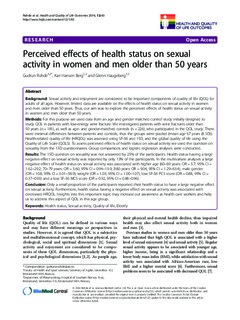Perceived effects of health status on sexual activity in women and men older than 50
Abstract
Background
Sexual activity and enjoyment are considered to be important components of quality of life (QOL) for adults of all ages. However, limited data are available on the effects of health status on sexual activity in women and men older than 50 years. Thus, our aim was to explore the perceived effects of health status on sexual activity in women and men older than 50 years.
Methods
For this purpose we used data from an age and gender matched control study initially designed to study QOL in patients with low-energy wrist fracture. We investigated patients with wrist fractures older than 50 years (n = 181), as well as age- and gender-matched controls (n = 226), who participated in the QOL study. There were minimal differences between patients and controls, thus the groups were pooled (mean age 67 years (8 SD)). Health-related quality of life (HRQOL) was assessed using SF-36 and 15D, and the global quality of life using the Quality of Life Scale (QOLS). To assess perceived effects of health status on sexual activity we used the question on sexuality from the 15D questionnaires. Group comparisons and logistic regression analyses were conducted.
Results
The 15D question on sexuality was not answered by 25% of the participants. Health status having a large negative effect on sexual activity was reported by only 13% of the participants. In the multivariate analyses a large negative effect of health status on sexual activity was associated with higher age (60–69 years: OR = 5.7, 95% CI = 1.62–29.2; 70–79 years: OR = 3.60, 95% CI = 0.94–13.9; ≥80 years: OR = 9.04, 95% CI = 1.29–63.4), male gender (OR = 10.8, 95% CI = 3.01–38.9), weight (OR = 1.03, 95% CI = 1.00–1.07), low SF-36 PCS score (OR = 0.88, 95% CI = 0.37–0.93) and a low SF-36 MCS score (OR = 0.92, 95% CI = 0.88–0.96).
Conclusion
Only a small proportion of the participants reported their health status to have a large negative effect on sexual activity. Furthermore, health status having a negative effect on sexual activity was associated with decreased HRQOL. Insights into this important topic may increase our awareness as health care workers and help us to address this aspect of QOL in this age group.
Keywords: Health status; Sexual activity; Quality of life; Elderly
Description
Published version of an article from the journal: Health and Quality of Life Outcomes. Also available from the publisher: http://dx.doi.org/10.1186/1477-7525-12-43

